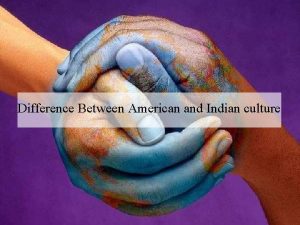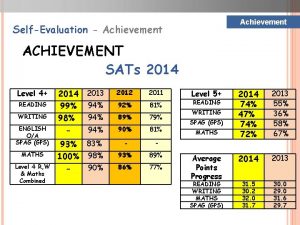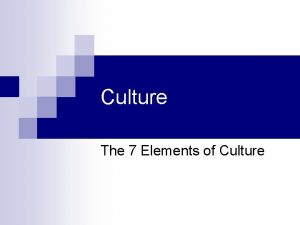Aspirations and Achievements Achievement oriented culture like our















- Slides: 15

Aspirations and Achievements

� Achievement oriented culture like our own, a person is judged by ◦ What his achievements are ◦ How they compare with those of others ◦ How early in life he is able to attain them. � If they are in an area that is highly valued by the social group, he will be more favorably judged than one who achieves more, but in a less prestigious area.

Effects of achievement on personality � Direct: Effects come from how the person evaluates himself. � Indirect: From his realization of how others evaluate him. � Direct effects have greater impact on personality.

Meaning of Aspiration � Ambition: It means an eagerness or desire to achieve a particular end- rank, fame, honor, superiority or power. � Aspiration: It means striving after something higher than oneself or one’s present status. � In aspiration, the motivation for achievement is improvement, while in ambition the motivation is the end result.

Kinds of aspirations � Positive and Negative Aspiration ◦ Negative: Goal of avoiding failure ◦ Positive: Oriented toward achieving success � Immediate and Remote aspiration � Realistic and Unrealistic Aspiration ◦ Causes of unrealistic aspirations �Uncontrolled imagination �Mass Media �Traditional beliefs �Ignorance due to inexperience

Factors affecting aspirations � � � Intelligence: Bright people have more realistic aspirations at all ages than those of average or below average intelligence. Gender: Males generally feel a greater need for achievement in school work, athletics, and vocational advancement than females. Interests: What a person is interested in will influence much of what he does. Values: They influence the intensity of person’s interest and give an emotional tone to his aspirations. Family pressures Group expectations Cultural traditions Competition with others Past experiences Mass media Personal characteristics: Foresight frustration tolerance, self esteem, ambition, and temperament greatly influence aspirations

Levels of aspirations � It is the discrepancy between the goal he has already reached and the goal he hopes to reach. � It can be unrealistically high or very low. When the gap is so great the chances of reaching the desired goal are slim, level is unrealistically high. � When the gap is very small, the level of aspiration is unrealistically low.

Methods of determining levels of aspiration � Laboratory studies: The person is given some task of moderate difficulty in which he is not skilled, such as throwing darts or doing exercises in arithmetic. He is told what score he made on his first trial and then asked what score he expects to make on the next one. � Studies of wishes: Study of wishes at different ages. � Studies of ideals � Studies of new year’s resolutions

Factors contributing to achievements � Training: Under the guidance of an experienced person to know how to make the best possible use of the abilities he has. � Experience: He must have experience, which comes with age and opportunities to enjoy wide and varied activities. � Past achievements � Flexibility � Independent � Motivation

Obstacles to achievement � Environmental: Unfavorable social attitudes based on race, gender, religion or age. � Work dissatisfaction � Lack of social acceptance � Subjective or personal factors: Unfavorable attitude toward self, from poor health, from lack of motivation and from many other subjective factors.

Success

Success � Satisfaction from success depends on his attitude toward the activity which is largely determined by: ◦ Values: Achievement in highly valued activities bring greater social recognition and approval as well as greater personal satisfaction than equal achievement in less valued activities. ◦ Prestige of activity ◦ Attitudes of significant people ◦ Monetary rewards ◦ Personal aspirations

Effects of success on personality Tasks in which the person achieves success are more satisfying, more attractive, and more challenging than those in which he encounters failure or disappointment. He is motivated to repeat the former and avoid the latter. � In addition to the personal satisfaction the person derives from success, his achievements tell him that his behavior is appropriate and so there is no need to change. � It encourages the person to be more realistic about his goal setting. � Many adolescents change their career goals in college when they realize that obstacles arising from personal, social, or economic limitations are likely to prevent them from attaining the goals they set earlier � Success enhances the self concept by increasing the person’s prestige in the eyes of others and adding to his social acceptance. � Too much success early in life may weaken the person’s motivation to do his best. � Extraordinary success may prove to be more detrimental than helpful to social relationships, arousing jealousy and resentment among those who are less successful. �

Failure

Failure � It may be acknowledged or grandiose. � Causes of failure: ◦ ◦ ◦ Lack of ability Lack of training Lack of motivation Unrealistic aspirations Prejudice (Gender, religion, race)
 Trade-oriented sales promotion
Trade-oriented sales promotion What is a column row db
What is a column row db Hopes dreams and aspirations
Hopes dreams and aspirations Method to fulfill the basic human aspirations
Method to fulfill the basic human aspirations Detail oriented culture
Detail oriented culture Our awareness of ourselves and our environment
Our awareness of ourselves and our environment Awareness of ourselves and our environment
Awareness of ourselves and our environment Awareness of ourselves and our environment
Awareness of ourselves and our environment Is our awareness of ourselves and our environment.
Is our awareness of ourselves and our environment. Reference guide on our freedom and responsibility culture
Reference guide on our freedom and responsibility culture Non material culture definition
Non material culture definition Continuous culture and batch culture
Continuous culture and batch culture Indian vs american culture
Indian vs american culture Stroke culture method
Stroke culture method Folk culture and popular culture venn diagram
Folk culture and popular culture venn diagram Popular culture examples
Popular culture examples





























